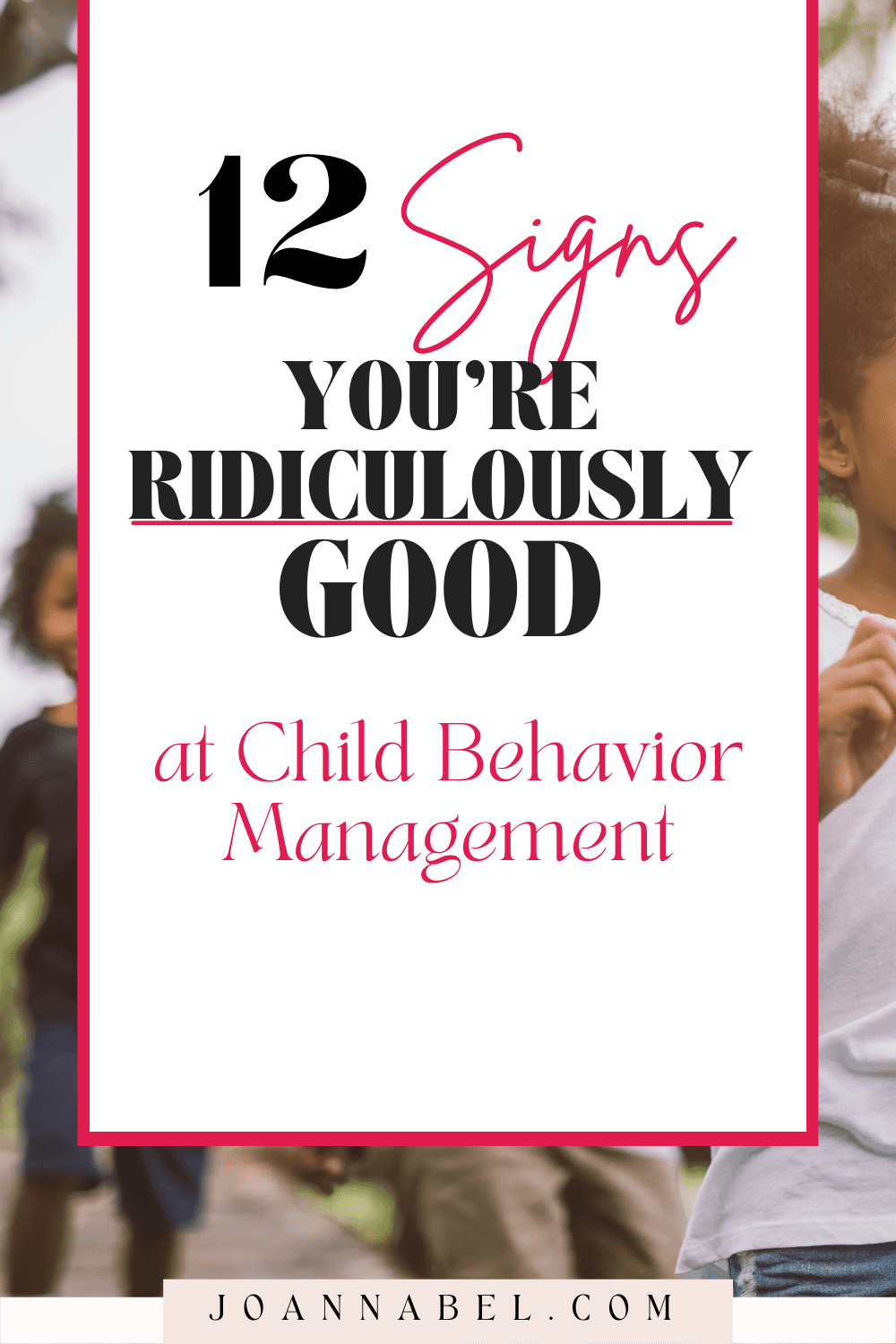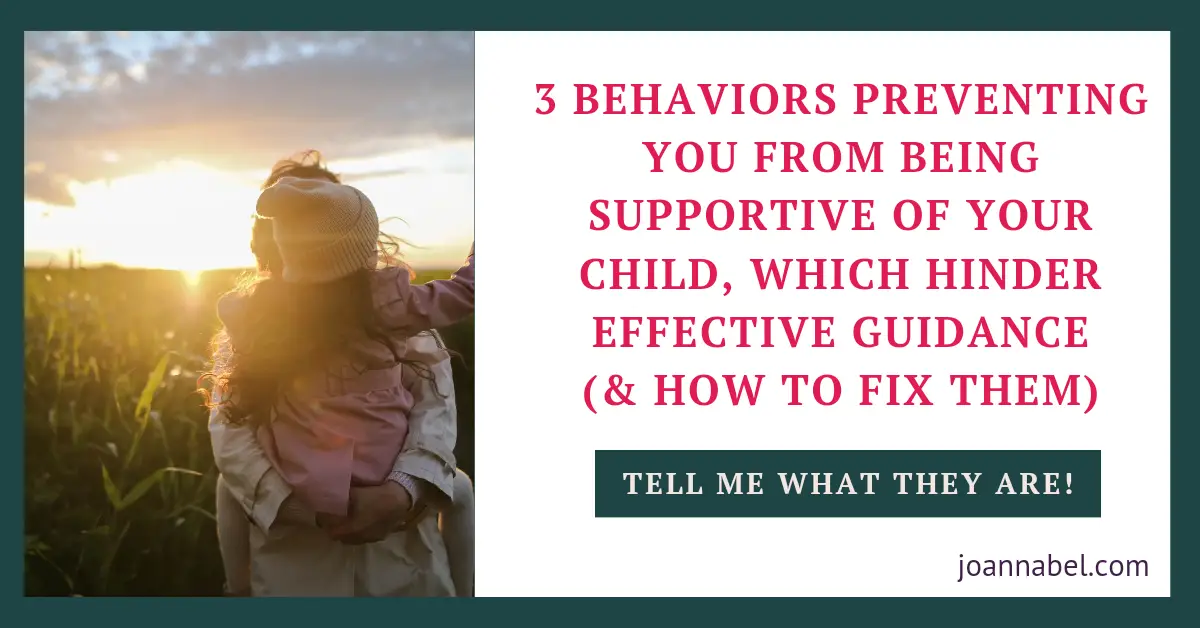Child behavior management is a topic that deserves a whole site dedicated just to it, but that doesn’t mean we shouldn’t do our best to start conversations about it!
You’re the most important expert in your life, but you deserve to get some support to be ridiculously good at child behavior management. So, why not do it together?

CHILD BEHAVIOR MANAGEMENT
Child behavior management refers to the strategies and techniques used by parents, caregivers, or educators to encourage socially acceptable behavior and discourage socially unacceptable behavior in children that involve understanding the particular child’s behavior, setting clear expectations for behavior, modeling socially acceptable behavior, establishing consistent responses or consequences for misbehavior, and using positive reinforcement to encourage desired behavior.
The goal of child behavior management is to promote self-discipline, social responsibility, and positive social interactions in children, while also providing a safe and supportive environment for them to learn and grow.
Effective child behavior management is in positive correlation to understanding a child’s behavior and development, individual temperament, and unique needs, and then implementing tailored strategies accordingly.
In this list of good child behavior management signs, among many other subjects, I’ll have a take on:
- understanding child’s behavior
- providing structure and finding balance with control
- modeling good behavior
- positive behavior management
- how to guide children’s behavior in a positive way
- balancing expectations about protecting kids and so much more!
So I invite you to stay with me until the end to get the best insights on this matter!
First, let’s talk about what child behavior management is and isn’t. But of course, it’s not about the definition, it’s about comprehension.
Note: Although I am a Clinical Social Worker, engaging with this website does not establish a professional social worker-client relationship. The information provided here is for general purposes only and should not be considered professional advice. While we strive to ensure accuracy and reliability, this content is not a substitute for professional guidance. For specific concerns, issues, or situations, it is essential to consult a qualified professional and present your situation. Read the full Disclaimer here.
CHILD BEHAVIOR MANAGEMENT INTRODUCTION
Child behavior management is a part of a bigger topic and concept and that’s Child Guidance and if we define child behavior management narrowly we can say that child behavior management is the parent’s or other child caretaker’s or educator’s efforts, actions, skills, and capacities for regulating and steering a child’s behavior.
But personally, (or professionally) I wouldn’t choose that narrow or strict definition. And that’s because we might get into a trap of reducing it solely to certain strategies, tactics, or techniques for managing children’s behavior.
This term child behavior management doesn’t mean you as a parent should be a manager in your relationship with your kids, nor does it refer just to some behavior management strategies or behavior management techniques. Because how you manage your children’s behavior is dependent on many other capacities and skills that are leaning on it.
For example your behavior – what behavior you’re modeling for the child, your parenting style, the family dynamics, but also systems in the social environment that surrounds the family as a system, and so much more.
To put it in perspective, the last one (among other things) means that the way you parent isn’t separated from how society positions, understands and supports parenting and the role of a parent. When society reduces parenting to only individual characteristics or skills of a parent that’s putting parents in a very lonely corner. And not only that, this simply isn’t the truth, and more importantly, it’s not a good way to treat parents.
Parents need systemic support not pointing fingers. This also means no magic wand will fix anyone’s skills regarding child behavior management, because different layers need to fit together.But this doesn’t mean parents don’t have the strength and skill in their hands to master this. It just means they should be supported!
And now that we cleared that out, let’s jump right to the first sign you’re crazy good at child behavior management!
Here is a list for you to have all 12 of them in one place, acknowledge them, and then continue reading to understand each of them better:
CHILD BEHAVIOR MANAGEMENT – LIST OF 12 SIGNS YOU’RE CRAZY GOOD AT IT AS A PARENT
1. You’re able to provide structure for the child and have a balanced attitude around control
2. You are consistent with structure and guidance
3. You keep away from over-controlling or overly punishing, or both
4. You’re able to modify your expectations about your child’s behavior
5. You keep away from oppressive, patronizing, or over-dominant communication and practices
6. You keep away from withdrawn or aloof parenting
7. You’re modeling prosocial behavior, empathy, and balanced expression of emotions
8. You keep away from overprotection (especially when it comes to preventing a child gain their own experiences) and overbearingness
9. You’re balancing rewards and punishment systems
10. You’re familiar with your child’s whereabouts
11. You’re responding properly and righteous if your child is hurting other kids or if someone is hurting your kid
12. You’re watching your child’s behavior closely but not intrusively
Now, let’s begin exploring each of the 12 good child behavior management signs.
Remember that it’s important to achieve the majority of them. Also, when you master some matters, they can positively influence others or solve an issue.
If at this moment that’s challenging, don’t worry you’re getting there, just keep going.
1. YOU’RE ABLE TO PROVIDE STRUCTURE FOR THE CHILD AND HAVE A BALANCED ATTITUDE AROUND CONTROL
This means that at the end of the day you’re in charge and you’re guiding the way. And kids know that and count on it, and this is why you have ”control over the situation”. But if you don’t, kids aren’t counting on it and they’re self-regulating the way they know and can.
Believe it or not, kids know very well to what extent they can rely on you even in the first months of their lives. And this is reflected in the affective attachment between a child and a parent. So if there’s a secure attachment between the parent and the child, then the children know they can rely on the parent entirely to meet their needs in the best way possible.
In case of an insecure or disorganized attachment that’s not the case. Here a child knows exactly what (and WHAT NOT) to expect from the parent. So then the child’s behavior is a result of their attempt to ‘’persuade’’ a parent to respond to their needs. Because in this situation a parent lacks the skills to respond in a way that fits the child.

I’ll write the post on this topic soon, but before I do it, if you need it now, learn more about attachment theory here. And if do, come back to this post, after you’ve understood the importance of (secure) attachment.
So this means parents have to be able to cope with their parenting role and that the parenting role and a child’s role aren’t intertwining. If everyone understands their place and roles and the personal boundaries are respected, that’s usually a good position for all. And it will positively affect the child’s behavior and the child’s response to the parent’s inputs.
Here you can see how important is to be emotionally and mentally mature enough (we’re never taking about perfection, because it doesn’t exist) to step into parenting role. And to think about your personal development first. Of course, parenting will be your chance for more spiritual growth. It’s not possible to be prepared for a relationship you’ve never experienced before, but you can be accustomed to proritize your personal growth.
Many times people think and talk about parenting in an organizational matter. And while that’s fine and important too, it’s the thing that most parents can learn more easily along the way. It should be the other way around, we should be more focused on our emotional, psychological, spiritual needs and self-exploration so that we can understand more about what we need and ask for help if we need it.
And we will need it and it’s going to be difficult at least sometimes. Your life would be so much easier if you get accustomed to self-exploration and personal growth sooner. However, there’s always space for improvement with the right amount of support available.
You may want to read also:
2. YOU’RE CONSISTENT WITH THE STRUCTURE AND GUIDANCE
This means that there is a coherent array of things or events that occur in your family structure that’s pretty much always the same, meaning that it’s familiar to the child. So they aren’t surprised or jumped by your actions or behaviors.
Also, the rules are clear and consistent. Meaning they aren’t being changed often and are followed. And in situations when they aren’t followed there’s a logical and appropriate consequence.
I encourage you to look at misbehavior:
- from a perspective of its meaning (put effort into understanding it, avoid reactive response),
- as well as if it’s repetitive (a pattern or situational, as well as if a pattern is in relation to your guidance),
- also if it’s actually logical that it occurred,
- and even positive that it happens (a too obedient child is often a red signal and warning for you that a child is frightened of opposing).

What I’m saying is to keep an open mind and question things and don’t punish your children because of their emotions.
Question if your rules are:
- too strict, or on the contrary – loose.
- unclear, or they change too often so kids can’t even keep up.
- even inappropriate by nature considering child age or in general.
What’s also important is that children know what’s expected of them. And that they get proper feedback for their actions. What’s important here is that you respond in a balanced way instead of a reactive one. Of course, it’s not possible to hold it together all the time, what counts is the average or the patterns.
What will always be very helpful with anything that’s going on, is working on the communication within the family and with your kids. Communication is often the cause and the solution to the problem.
Stay with me to learn about the next skill that might say you’re mastering child behavior management.
LIVE Q&A And Consultations with Jovana (WISHLIST)
Want a chance to get included in live weekly calls with me and get access to my expert insights, advice, recommendations, and guidance for your unique situation?
Consider signing up if you are aiming for:
- achieving tremendous child-parent relationships with the least effort possible as you learn what to focus your attention to
- attuning to healthy child development practices without losing yourself in the process and ignoring your human needs, rights, and aspirations for your life
- understanding and responding to your and your child’s needs better and carefully easing the tension between the two
- having your most pressing questions and concerns addressed and ongoing support
- getting skilled in honoring the child’s best interest in each life situation with the help of a few key rules and principles (child wellbeing, independence, autonomy, participation, and equality)
- experiencing a supportive and cooperative relationship with the other parent or a co-parent even in high-conflict circumstances
Address your doubts, concerns, and challenges, but also reflect on your situation through the experiences of others in this small and supportive community.
You’ll unlock monthly access for 60% off of my current hourly rate!
3. YOU KEEP AWAY FROM OVER-CONTROLLING OR OVERLY PUNISHING, OR BOTH
If you’re using punishment too much, too often, in an unbalanced way, heavily, harsh, inappropriately, then the punishments lose their function. This means you lack knowledge or skills in managing them.
They become useless because then they can’t be effective, and you could end up torturing the child. In general, punishments should be carefully used and they shouldn’t be the focus of a parent‘s response to misbehavior.
What should be the focus instead, is the outcome and consequences of misbehavior.
So, this means that when we acknowledge and admit what happened as a result of some of our actions. Which is much more beneficial for everyone, in comparison to what comes out of a punishment.
This helps us understand what we caused and do something about it to redeem it. That’s the only way that both sides can meet their needs at that moment.
Unless this is done properly both sides are left with a void, long-term dissatisfaction, sadness, anger, etc.
This may sound counterintuitive to you because you think – wait, but they’re guilty! So what needs could they have and why should we think about that, I mean they did wrong??

And I understand that. Society teaches us how bad we are when we do anything against the norms and rules.
Even when they don’t feel fair or even humane to us. So it’s only logical for us to think how anybody who did anything wrong (how big or small) deserves ‘’bad’ not good.
But I encourage you to open your mind and think about the consequences of the bad deed – in terms of what should be done about those particular consequences.
What’s the way to improve things and what do we gain from the punishment if we think about these consequences?
So we stop and think about what’s the best to do – to punish, to focus on the repairment, or both?
And over-controlling leads to great resistance, and if it doesn’t, this probably means you’ve already broken your child’s spirit.
Try to put yourself in their shoes and please don’t tell me ”but they’re kids, they’re to be controlled”.
They are to be accepted, guided, and supported, and yes control is part of that. But having control doesn’t equal overly controlling, overly regulating, and robotization.
Kids are not bots, they’re worthy human beings just as you are. Adult human rights are not more important than theirs.
We’re moving to our next indicator you’re great at child behavior management.
If you are using punishment and want to be sure you’re using it safely and adequately read my post: What Is The Best Way To Punish A Child?.
Additionally, the post that probably interests you as well is:
4. YOU’RE ABLE TO MODIFY YOUR EXPECTATIONS ABOUT YOUR CHILD’S BEHAVIOR
This may sound a bit weird for different reasons. I’ll explain. Before I do, remember you should set high expectations for your children so they can reach their full potential. But high isn’t the same as too high and unbearable.
First of all, not many of us are aware of how high criteria society puts on children.
These standards are higher than those for adults.
These standards and expectations get even higher when gender is in the equation. (Think about to what level is your daughter expected to obey, be polite, nice, and sweet, and how much is it tolerated for her to get angry and to oppose/stand up to someone).
And in general, it’s expected for children to obey (everyone) and not ”impose” their opinions. Or even have them in many cases! Think about this for a minute.

Remember how many times you got a saying about an important matter when you were a child. The answer might just be NEVER. And then think about the same thing when it comes to your kids.
Most of the time what people do is spend time trying to think of as many arguments as possible they can think of, just to prove that children aren’t capable of having an opinion, making decisions, having an attitude about things that matter to them, disagreeing with something, or promoting something they favor.
This time needs to be spent engaging in activities that will support children to express themselves. Show what they know. Express their views, and be encouraged for it, not suppressed.
Children are entitled to this right, the right to express their views.
These rights aren’t to be passed on to someone else. It’s what the UN Convention on the Rights of the Children GUARANTEES to them and it’s the obligation of adults surrounding them to enable and support the practicing of that right.
Secondly, when we receive input to balance our expectations we often end up either lowering our standards too much or constantly going back and forth from low to high expectations.
And end up completely losing the sense of control over the situation. Together with ourselves in it.
Now, this is challenging in many different areas of life and the relationships tied to those areas. What can help is focusing on how we come across to others including kids.
Explore it a little bit:
- How much maneuver space do you leave for others (and kids) to respond to your expectations and demands? And what do you do when they don’t? Are you punishing them?
Too little creates narrow room for getting it right so then, in the long-term, this leads to people giving up on trying (and on you) because it’s impossible to live up to your too high expectations and demands.
They feel they have to behave exactly like you order or they’ll be seen as naughty, rude, or bad. This puts them in a vicious circle of guilt.
And they simply won’t put up with the constant dealing with guilt anymore.
- Do you set standards and expectations at all?
Avoiding to set any demands creates an impression that you don’t really need anything else and that you’re ok with everything they’re doing.
Or even that you don’t really care about any of it – in time not setting boundaries leads to exhaustion, burnout, and other mental health challenges and issues.
- Are you going in circles from low to high and high to low expectations?
When you set too high expectations, then when no one can satisfy them, you can feel forced to set standards too low. This then comes across as inconsistent and inefficient, so you don’t get the response you’re hoping for either.
Then you go back to the high ones, and you get back to where you’ve started and get nowhere.
Or you go from too low standards to too high ones, because of exhaustion and burnout, so now you don’t have enough strength to do better. But then when it doesn’t work you go back to the start, so again, you get nowhere.

Thirdly, it’s important to think about do we let the kids just be kids and don’t expect them to fit the criteria for adults. Believe it or not, this is common.
Let them have fun, explore, make mistakes, and get to be mischievous. I believe adults should do these things also, but how often does it happen, right?
And of course, all of this can be balanced out and in perfect harmony with responsibilities, discipline, and accountability.
Do you believe you’re able to keep expectations in balance?
Share your views in the comments! Participation is one of the core values of this web place.
You might be curious to read also:
5. YOU KEEP AWAY FROM OPPRESSIVE, PATRONIZING, OR OVER-DOMINANT COMMUNICATION AND PRACTICES
This positive child behavior management pointer is about equality or better said ”equivalence”. Because being treated as equally worth isn’t the same as treating everyone the same.
This means providing equal opportunity for each one of us to express ourselves and thrive in life. It doesn’t EVER mean to reduce everyone to the same ‘’level’’ of functioning and use restrictive criteria that will support our intention not to include people different from us in the conversation.
(For example, if women are the same as men, why don’t they work at the construction sites silly arguments. I’ll say silly but what I mean is discriminating. So then if they can’t do this or won’t, well, then they shouldn’t ask for managing positions.)

And it’s the same with kids. We must respect the unique position of children in the family and the world.
Once we do this we will see them as equals (equally relevant, valuable, important, and articulate/reasonable) but with acknowledging the different positions and circumstances that surround them, in comparison to us adults.
Once we see them as equals, and not someone that needs to prove their worthiness and competence to us, we won’t be patronizing, oppressive, or overly dominant with them.
It’s the change in perspective and perception of children and their position that leads to:
- more respect we show for them,
- more effort put into delivering opportunities for them to express their views,
- more trust in their competence to manage their lives
- and more competence to be a part of the decision-making that’s affecting their lives directly or indirectly.
If we see them as partners we treat them better.
We improve our relationships.
And we make their and our lives more beautiful and worth living.
The best tip for you is to take a step back and think about your perception of children, their role in your and their lives, and society’s residual beliefs about kids.
If your beliefs match society’s ingrained standpoint about kids, you need to shift the attitude and enter the new and advanced epoch of your relationship with your child.
If you found the information on the blog helpful & inspirational and you feel like giving back, you can do it by clicking the donate button after entering amount you’re comfortable with. I’ll use it to create and deliver more useful content and resources like this. Thanks for your precious contribution!
6. YOU KEEP AWAY FROM WITHDRAWN OR ALOOF PARENTING
We spoke of not setting standards as a nowhere-heading solution for anybody who’s a part of that situation. And this is part of that or the outcome of that.
By withdrawn I mean withdrawn in a certain important dimension of parenting capacity, or more of them.
A person that’s withdrawn pulls back from setting the boundaries, avoids confrontation, or withdraws from them in communication with others or with the child.
Maybe we can skip some arguments here and there. Yet in general, dealing with different conflicts that lead to disagreements or arguments is super beneficial.

In the case of parenting, we simply have to draw the lines. Guide the way. Confront and manage behavior unless we want to face unpleasant consequences.
That’s just part of the job of a parent. So setting standards, (high enough) expectations, and boundaries should never be ignored if we want positive outcomes. And to avoid the negative.
With aloof parenting, it’s even a step further.
The reason for this is the fact that, besides avoiding providing structure and set demands, this parent expresses disengagement.
This means the parent lacks emotional connection, warmth and emotional responsiveness to answer to the child’s needs and emotions accordingly. So these parents fail to set limitations or sets them sporadically while being inflexible when they do.
These are the cases with permissive, rejecting, and uninvolved parenting styles.
If you want to know more about parenting styles and find yours, check out my article Parenting styles all you wanted to know.
Read also:
7. YOU’RE MODELING PROSOCIAL BEHAVIOR, EMPATHY, AND BALANCED EXPRESSION OF EMOTIONS
This topic requires a whole blog post on it or more, but I’ll try to shorten it as much as possible.
It’s pretty self-explanatory that modeling certain behavior is the fastest way to assure those you’re modeling it for, begin adopting it.
Therefore, what’s the most wanted is modeling prosocial behavior.
This means that you make sure you model positive conflict resolution, as well as following social norms and legislative rules in one’s society. And also that you make decisions and behave from a base of values that are well adjusted and based on healthy foundations.
Of course, following social norms doesn’t mean that you should follow any convention just because it’s there.
Quite the contrary.
You should definitely train yourself to question everything that doesn’t seem right and also, do things your way and promote freedom of choice.

So what I mean is simply aiming for a behavior that’s well-adjusted, flexible, unhurtful, and positively structured.
And if you’re experiencing a problem with this, you should most definitely decide to do something about it.
This will be a win-win situation for you. Considering you’ll not only help yourself live a better life but will also assure your children live their best lives too.
With all of this comes empathy too. Means you show them what it means to be able to recognize and reflect other people’s emotions and respond to them in the best way.
And you should start with them (kids), as well as with the children’s other parent. So make sure to first show empathy there.
Then as their social environment expands, you show them how to do it with other people through your example. As well as correct them, if they mess this up.
You’ll often hear that it’s all about empathy but it isn’t.
What’s also important, as well as acquired, is being able to decenter.
So what is decentering?

As you already know, good communication depends on mutual understanding. Yet, this is hardly ever possible without the capacity to decenter from our point of view, so we’re able to see things from the perspective of someone else we’re communicating with.
So, decentering refers to the cognitive level of stepping out of our shoes, but in a matter of our thinking and observing a situation.
Maybe we can say that we need to ”get out of our heads” to be able to do it. This means empathy is obtained on the emotional level and decentering on the cognitive.
Finally when it comes to a balanced expression of emotions, what most think of first is anger. And of course, that’s right, but it’s not limited only to it.
Its’ also the sadness, overwhelmedness, and in general being all over the place with your emotions.
That’s on the one side of the continuum, while on the other side is being cold, aloof, resigned, etc. This is why we say balanced.
Now there are many reasons why you might end up in this position. Still, what you can do to help yourself before it’s gone too far, is for example:
- Set boundaries for yourself and others,
- Ask for help,
- Be mindful of the decisions you make, that could put you at risk of overwhelm or even danger,
- Take care of your mental health,
- Give up on habits that do you harm,
- Look for others that were or are in your shoes, think about support groups or communities, etc.
Now let’s move to our next sign. If you find value in this post, remember to share this post with those who you believe need it.
8. YOU KEEP AWAY FROM OVERPROTECTION (ESPECIALLY PREVENTING A CHILD GAIN THEIR OWN EXPERIENCES) AND OVERBEARINGNESS
This is such an important topic. Especially nowadays, where we know more about the importance of child protection. Which is good.
Unless it becomes a place where instead of protection, kids face ”suffocating”.
Now, I’m using this word, because I want to paint a picture for you to understand how children can feel with overprotection.
So, they can feel smothered, overly controlled, overly pressured, expected to be dependent all the time, and lack competence to deal with frustration, and in general any inconvenience.
Too much protection turns into intimidation.
This then leads to ‘’being late’’ with independence and maturity.
Because with growing older, kids should claim their right to raising autonomy in decision making and independence that is gradually evolving.

What’s also important here is that overprotecting them stops them from gaining their own authentic experiences and going through them all together.
So, learning from these experiences, and expanding their competence in handling the emotions that resulted from them, which can many times be conflicting (internally).
This helps us move forward from it and start over instead of pulling back.
So you can’t and shouldn’t protect them from their own life.
Now I know that you’d do anything to protect your child, and that’s a good thing. You’re a good parent because of that.
However, you need to find a fine balance where you are always there for them, you keep them safe but you don’t stop them to gain their experiences and being centered in their lives.
This applies to all ages, it’s just that with aging they need less support in doing things by themselves.
And this means that this way, you’re showing support and you have empathy and can decenter no matter what their age is.
If you’re curious about how you can help your child become more independent, then read my blog post that covers several principles that promote independence you should stick to.
Here is the link to it.
Or if you’re unclear on why it’s important to promote independence for kids, read my post about 10 reasons why it’s important for a child to be more independent.
If you found the information on the blog helpful & inspirational and you feel like giving back, you can do it by clicking the donate button after entering amount you’re comfortable with. I’ll use it to create and deliver more useful content and resources like this. Thanks for your precious contribution!
9. YOU’RE BALANCING REWARDS AND PUNISHMENTS SYSTEMS
We can see many good and caring parents who are willing to ‘’sacrifice’’ for their child (we won’t focus on whether or not this is functional to do right now). But their way of parenting looks more like managing than like parenting that’s based on acknowledging children as individuals entitled to be the center of their own lives.
So they do push children to do their best and they’re willing to pay attention to implementing more or less positive discipline. But what’s lacking is their decentering (or stepping back a bit) from being responsible for the child’s well-being, and becoming more attentive and therefore responsive to the child’s emotional needs.
This is a finesse that parents need to ”catch” because it makes a crucial distinction between the authoritarian and the authoritative parenting style.
As we mentioned the authoritative or democratic parenting style is the best from the child’s developmental needs standpoint.
(You can learn more about the authoritative parenting style in my blog post which explores authoritative parenting style characteristics and effects.)
But more importantly, a distinction between understanding parenting as a job – where your focus is on giving a child what a child needs and understanding it as a job – where you need to finish all its tasks and obligations.
BECAUSE IT IS A JOB. So pat yourself on the back because you’re keeping it together even though you’re working 24/7.
When you think of parenting that way, then you become more kind and compassionate with yourself, and this can increase your self-love, even.
This happens because you know that even when you make mistakes, and you’re overwhelmed, or you can’t manage everything ideally (by your moral high ground) you’re there for your child in the best way.
Considering you’ve developed a hearing for their true needs, wants, perceptions, and emotions. And this is when everything else becomes less important and your mistakes or anyone’s expectations become so small.
Even your expectations for yourself. Not to mention the critical part which is your child’s well-being and thriving as an outcome.

This is why being attentive enough to the child’s emotional and other needs (that can also be the same as the needs of adults but with acknowledgment of a child’s special position of dependence in their relation to parents/adults and dealing with it accordingly) is the key to creating a meaningful relationship with your kids.
Just a quick reminder – this doesn’t just relate to the emotional needs – like love, acceptance, empathetic response, or kindness.
But also the need for guidance, support, dependence and independence, and limits. Because you address these dimensions by approaching them as a responsive parent, therefore you approach them optimally.
When parents develop a sensitive reception for recognizing what the child needs, a parent won’t make that many mistakes concerning discipline.
This means they’ll become more skilled at balancing rewards and punishment systems (if they’re using punishment).
This is why you don’t need to look for and learn discipline techniques from someone else. You have it all in your hands.
This is true because when you become a responsive parent (emotionally warm and responsive) you know what you need to do, considering you:
- acknowledge a child’s unique position (concerning positions of power, dependence, developmental stage),
- you show interest in the child’s perception and its emotions
- and you’re respecting its perception and its emotions.
This way you become clear on the position and purposes of rewards and punishments.
Then you never use them reactively but to limited extent because in the focus of discipline isn’t punishing it’s learning. This means punishment shouldn’t be “in charge”, because it’s nothing else then a resources at hand when you need to implement restriction.
They become in charge when parents overuse them and when they are in disbalance.
If you’re not sure how to use punishment properly read my post that tells you about the principles you should follow. Use this link.
You may want to check out also:
The next pointer of being crazy good at child behavior management is a no-brainer for many parents.
Yet for others, it’s not as simple as it sounds. Let’s see why.
10. YOU’RE FAMILIAR WITH YOUR CHILD’S WHEREABOUTS
This is a matter of parental control and supervision. It’s one of the good parental control indicators.
And often with kids with defiant behaviors and almost always with youth in conflict with the law parents lose sight of the child’s whereabouts. They either don’t know at all where (with whom) the child spends time, or they believe they do, but that’s not the case.
Considering these kids are easily manipulating the parent and the limits from a long time ago, and at some point, they even took control and became in charge.

Sometimes before this, a child got into a triangulation with the parents. Here their roles became intertwined, and the family dynamics led to the child being in a position to manage themselves the way a child knows, which isn’t much at that point or phase.
So then when a child expresses defiant behavior or even worse, reaches a stage when it’s already involved in misdemeanor and/or criminal activities, the way to treat a child’s behavioral issues isn’t simply to ”fix” a child. That’s because a child returns to the environment where this behavior had a chance to evolve. So the family dynamics need observation and addressing too.
The best tip for you is to set boundaries at early stages where children know they have to share their movements with you. Yet in doing this you shouldn’t act like someone they’re reporting to, then like someone they trust, and someone who cares.
They will oppose at times (we all did). But your way to address this is to give a reminder that your job is to know they’re safe and that you won’t judge them because they want to do certain things that are part of growing up.
If you create a safe space, it’ll be easier for them to tell you the truth even when it’s the least convenient. Of course, all of us have lied from time to time.
Sometimes even in order not to hurt the parent, even when that wasn’t necessary, and yet we believed it was.
But there’s a big difference between knowing you can trust your child and they can trust you in general, while both being aware nobody is perfect and living in uncertainty, mistrust, pain, and loneliness.
Some random/seldom differences, variances, or deviations from the norm don’t affect the established, general healthy base you’ve already built.
11. YOU’RE RESPONDING PROPERLY AND RIGHTEOUS IF YOUR CHILD IS HURTING OTHER KIDS OR IF SOMEONE IS HURTING YOUR KID
It’s not possible to cover everything concerning this topic here, but let’s at least start with it, shall we?
Naturally, you want to have your child’s side and I salute that. Still, this must come with certain restrictions and limits.
Most parents (intrinsically) have the urge to protect their children from any harm. But with more experience as a parent, you learn that sometimes you just have to fight the urge to do so, for their good.
And that’s the case when they’re supposed to learn to do certain things by themselves – where they have to grow a tolerance for a certain level of pain (we really shouldn’t be too afraid of pain, try to remember this).
There’s a great importance of this to be noted because avoiding any pain leads to the pain of others eventually.

Of course, this is not the only reason children hurt other children, not even close, but this is hurting them too.
Considering it stops them from experiencing true growth and expansion of their capacities (they’re preoccupied with their efforts to protect themselves from anything unknown, new, or ”hard” so they aren’t able to do it).
If your child is hurting other children, you should put effort into understanding their behavior (are they fighting back or they’re establishing their dominance – so if they’re the victim or they’re subordinating others to their comfort).
And you must be righteous and take responsibility in this situation, no matter what is happening at the center of things.
Maybe a child is acting out because it’s going through big changes in their life that they’re trying to adapt to, but they can’t do it that well and they need support.
Or maybe a child’s behavior is adopted through modeling a parent.
Or maybe a child doesn’t receive enough guidance. These are just some possible reasons.
Nevertheless, our efforts for understanding the child’s behavior shouldn’t end with blaming the parents and leaving things.
The focus of these things should be on kids, not parents. Focusing on putting the blame on parents (or releasing guilt as parents), serves only for us to calm our unease, but it won’t help the kids.
Whatever activities you take on from that point should be focused on strengthening your child’s prosocial behavior and HELPING THEM.
It’s so important to teach them and show them what’s not acceptable. And help them make up when they did someone wrong.
Positive child guidance and responsive parenting is your solution to these situations.
Of course, if your child is vulnerable to the abuse of others (meaning it gets targeted repeatedly) besides removing them from a highly threatening situation, you must take action to strengthen their assertiveness.
If you’ve never heard of this term look it up.
And we’ve succeeded to get to the last pointer of notable child behavior management.
12. YOU’RE WATCHING YOUR CHILD’S BEHAVIOR CLOSELY BUT NOT INTRUSIVELY
This is related to what I’ve previously mentioned when I talked about not positioning yourself as someone kids have to report to, but as someone, they trust to confide in and keep them safe. This nuance is a distinction between an equal and not equal relationship, and it affects the quality of the relationship.
Intrusiveness is often a result of the authoritarian leadership type. These relationships are too close because parents have high demands and expectations for the closeness of family members. And they show they expect and demand (absolute) obedience and loyalty from their children. You can learn about the authoritative parenting style in my post that covers this parenting style.
It also has to do with providing freedom and letting them claim their privacy. Freedom and privacy are not to be understood as the limitless possibilities to do whatever they like, naturally. The focus is on flexibility (this means not inflexible-rigid or too flexible- too soft )of boundaries and rules.
Here free will, personal space, and freedom of choice aren’t suppressed, but with setting clear limitations that are healthy for them. Think of limits as walls of an average room you’ve entered and they’re there to help you understand where the rooms begin and end, so you can find the proper orientation. This certainly isn’t the best example, but it paints the picture.
They simply have to know where to, or not to go. What’s acceptable and what isn’t. And considering that thr first environment they bump into is their family, they’ll want to copy parts of that structure to the next environment they get into.
So you’re managing the behavior as a person in charge, but with this, as a standard, you’re not possessing a child. Therefore you’re not to be asking for unconditional loyalty.
As opposed to this, you give them the opportunity to form (and express) their views and have them affect decisions more and more independently as they mature. While supporting them in getting what they need to be able to do exactly that.
Note: a child can express their views at ANY age, it’s just that the ways they will do it are different, together with their level of independence.

If you have understood the purpose of child guidance, then you know your job is to help them learn how to manage their emotions and behavior and develop crystallized social norms and values. If you do this right, soon enough you won’t be obligated to manage so much. As you’ll be there to moderate certain things and support them along the way.
This is why you won’t need to be intrusive and always in the loop. Intrusiveness also can have something to do with how well you handle separation from your kids, but also anyone actually. If you’re not handling it well, this is something you should start addressing as soon as possible. Simply because it’ll bring pain to you and others around you.
For example, nobody is immune to abandonment. Yet there is a difference between avoiding it at any cost (including manipulation that can get quite toxic) and being in pain for a while, and then moving on from it eventually. But letting separation happen when it needs to happen.
This issue will reflect on your relationship with your kids because you won’t be able to support them in separating from you. Considering you might interpret this and feel like they’re abandoning you.
This way you’ll create an unhealthy relationship and force your kids to eventually do what you most fear – distance themselves fron you or abandon you.
Note: This doesn’t only refer to separation when they’re about to start living separately. But also to clear boundaries between the parent and the child that support the child to form a distinctive personality. This is a part of the individuation process, or the process of reaching a stable, independent personality.
They probably won’t lose contact with you, but they won’t be able to have a close bond with you, and this will feel very similar to you. The best tip for you is to challenge your perspective, expectations, previous experiences, and beliefs concerning relationships. This way you get a chance to approach this matter the best way possible and start creating the most profound bonds with your children.
Latest Posts:
- A Guide to Balancing Parenting Roles After Divorce

- Gifts for Your Teenager That They’ll Actually Enjoy

- 6 Reasons Your Teenagers Seem Distant and Distracted

- Special Gifts to Let Someone Know You’re Thinking of Them (13)

- 100 Ways to Challenge Yourself (Without Stretching Yourself Too Thin)

- What To Do When Your Parent Struggles With Alcohol

FINAL THOUGHTS ON CHILD BEHAVIOR MANAGEMENT FOR PARENTS
We’ve reached the end of our 12 signs you’re ridiculously good at managing kids’ behavior. And I really hope you find it helpful and that it resonates with your views. If they don’t, feel free to share your opinion by commenting on this post.
These 12-pointers don’t exhaust the topic of child behavior management. Still, they are clear signs you’re crazy good at managing your kids’ behavior. And remember, it’s never about excelling at everything or being perfect. It’s about creating what’s functional for your life.
What also counts so much are your efforts and dedication. Just keep going.
And now to you, how do you estimate your skills for managing child behavior? Feel free to leave a comment! I’ll see you in the next post! Here’s one:









Leave a Reply